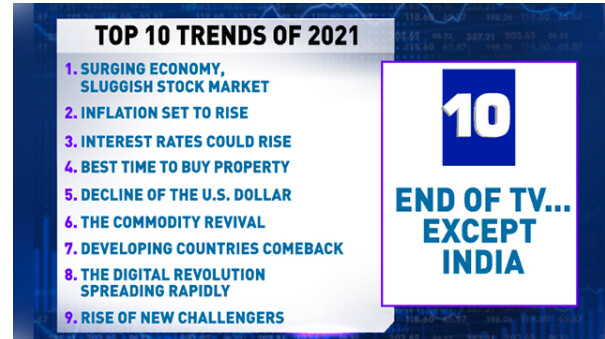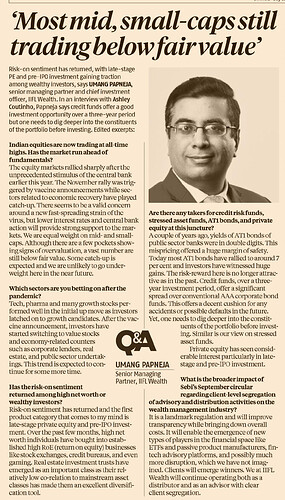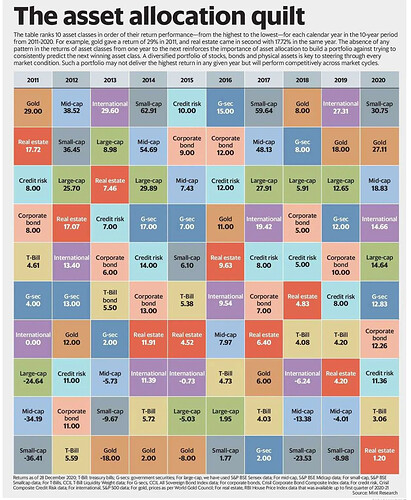A very interesting article by a16z regarding what the next decade could look like for “Audio” and its applications
A good article on why Wikipedia doesn’t do ads and why you’ve probably been receiving “please donate” on your recent visits to the website (the article also estimates the revenue potential of Wikipedia)
Good interview by Mr. Raamdev Agrawal on Sector preferences in 2021.
Lessons From The Tech Bubble
Tweetstorm by Corry Wang
Source: https://twitter.com/corry_wang/status/1345192560847958016
LESSON #1: Everybody knew it was a bubble
Unfortunately, the quip “it’s not a bubble if everyone says it is” just isn’t true
Investors were comparing the internet sector to tulip mania as early as mid-98. Bernstein held an entire conference on it in June 99!
LESSON #2: Calling bubbles is easy, making money is hard
In truth, the hard part about the tech bubble wasn’t noticing it. The hard part was timing it
Our equity strategist tried in January 99… he was off by 14 months (and another 30 point gap in value vs growth)
LESSON #3: Nobody knew the bubble popped until months after it did
Nobody noticed in March 2000 when it finally popped. Our equity strategist (who bet his career on it!) didn’t catch on until June 2020
LESSON #4: “Tech” bubble was a misnomer… it was really a large cap growth bubble
Yes, Microsoft traded at 70x earnings. But Coca Cola was 43x. Pfizer was 92x. Every stock here was a disaster over the next 10 years…
LESSON #5: Most large cap tech stocks in the bubble had real businesses with strong fundamentals
The internet stocks were a sideshow. In 2000, the software sector had a $1 trillion market cap, 20% net margins, 20% annual growth
The problem? It was trading at 16x sales
LESSON #6: Fundamentals follow price, not vice versa
The bubble popped in Q1 2000. Fundamentals didn’t decelerate until Q4 2000.
It was reflexivity at work. Lower stock prices = less capex spend = less revenue growth = lower stock prices. A vicious cycle
What’s the takeaway here?
Be humble.
For bears, it’s easy to call a bubble. Anybody can do that. Timing is the hard part.
For bulls, it’s easy to point to the fundamentals. Historical investors weren’t dumb. Matching fundamentals with price is the hard part.
Here is my humble attempt to decode 1983 letter to shareholders by Warren Buffet. Please let me know your feedback on the same: https://twitter.com/manujindal2803/status/1345244346908434432?s=20
Found this to be a great summary of last decade. By @zygo23554
The decade that went by-0001.pdf (558.9 KB)
https://sabercapitalmgt.com/end-of-mean-reversion/
Very good article on disruption of the financial theory of mean reversion
When it comes to bubble Jeremy Grantham has a solid reputation.
- He got out of the 1987 Japanese bubble three years ahead of time.
- Warned about 2000 bubble well in advance. He was little too early in calling out the bubble hence lost almost half of his funds as his investor could not bear his underperformance.
3- Warned about 2007 bubble in good time.
He believes that the current stock market situation is nothing short of the bubble. However, when it bursts is anyone guess.
Must read if you are wondering why the stock market is going up vertically.
" Every career incentive in the industry and every fault of individual human psychology will work toward sucking investors in."
Can you please explain “Similarly, Emerging Market equities are at 1 of their 3, more or less co-equal, relative lows against the U.S. of the last 50 years”. What does he mean?
Emerging markets are in bubble however the bubble are relatively low compared to US or Emerging markets are normally priced and US is in bubble
Please explain how to apply this in indian context? Ours is entirely different. GDP to coporate profits are lowest. Pharm and IT are having good earnings growth. High interest rates. Not megalomaniac like tesla
Good annual letter written by Abhishek Basumallick
What a fantastic read.
Ruchir Sharma on trends in 2021 .

Something to Ponder over below 





